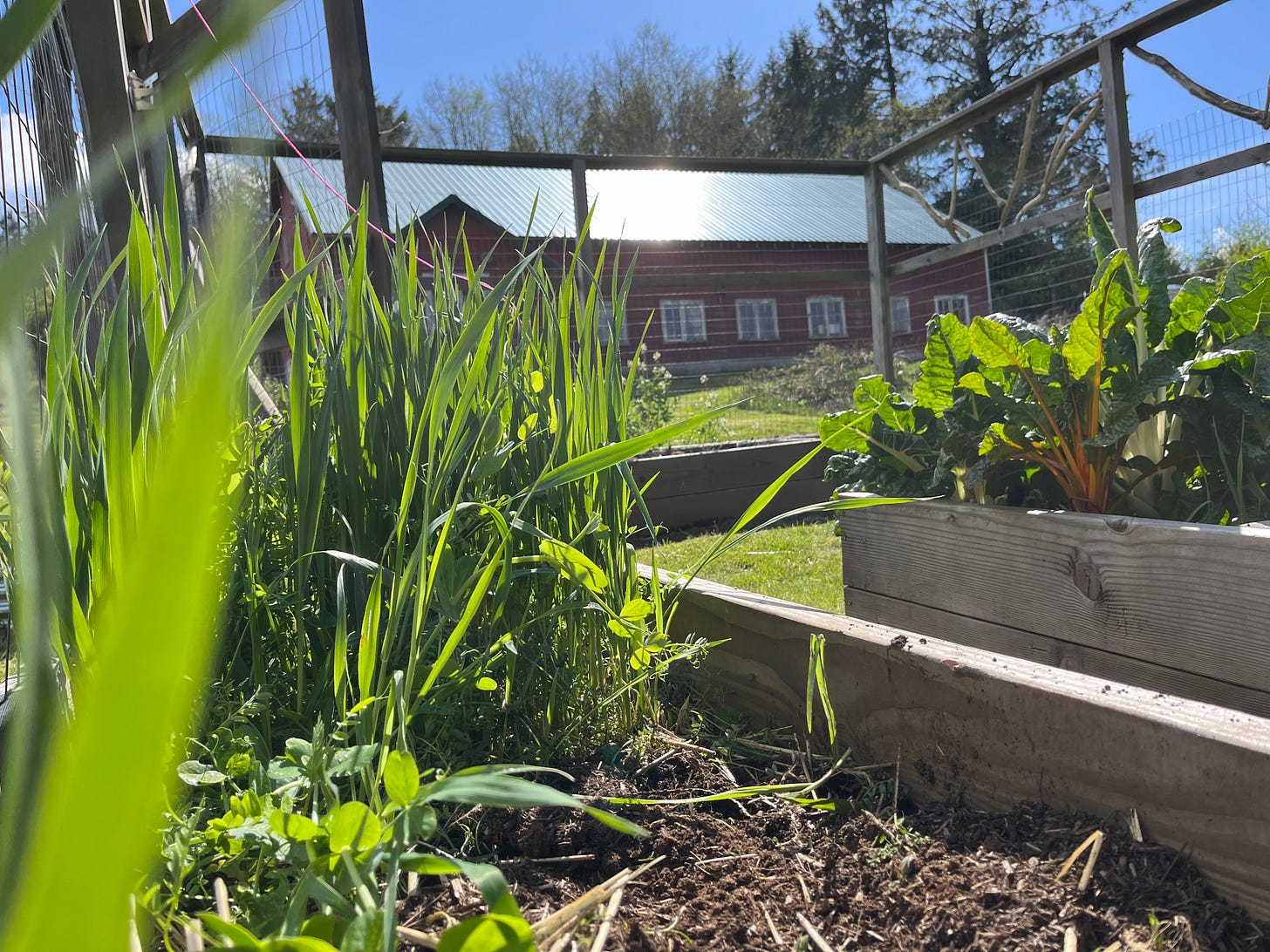An Exclusive Writing Lab teaching from behind the scenes of a serialized memoir-in-progress. Plus an invitation to our next live teaching where you submit work.
🎧 Audio of this teaching below the paywall.
Welcome to Flight School:
We are seven chapters into The Summer of ‘72. If I am doing my job, you should be asking a lot of questions. You should not feel overwhelmed or confused. You should almost feel like: “Okay, move it along, I am ready for more.”
Now, let me show you how I’ve created these effects.
First, to the garden:
Welcome to spring where it’s time to rotate in the cover crop, add amendments, and turn the soil. Careful. Careful. Do not unsettle the hearty chard, arugula, and garlic that wintered over.
Last fall, while listening to Doctor Zhivago by Boris Pasternak, I hammered in steel mesh to the base of all the beds, built two new boxes, then finally pushed the main bed back by eighteen inches.
All of it, last fall and now, is dirty, hard, rather unsatisfying work. No one can see I’ve thwarted both moles and voles from their predictable attack with my clever infrastructure choices. You’ll not see all the different amendments I’m adding either.
There’s a parallel to be drawn here with The Summer of ‘72. As you read, you will not see nine years of hard writing and re-writing, my deep study and thought, or the gallons of tears wept. You will not see how each draft led to shock, depression, and a sticky inheritance of shame (which was actually complex PTSD) doing it’s destructive work. You won’t know I cured my complex PTSD in order to finish this final draft (unless you read about that journey here).
What you care about most?
Like someone sitting down to a meal of freshly harvested fruit and veg, you likely don’t care much about my foundational work in the garden. You’ll likely want to know if its organic, but after that you’ll say, “Let’s eat!”
With Summer, it’s pretty much the same. The serious creative writing student will be saying, “Okay, great, you did a lot of work to bring us this book, but now teach us what’s going on here.”
Okay. Let’s get to work.
Scene. Scene. Scene. Backstory. More scene.
I’ve been teaching scene on Flight School since I started posting. You can find those teachings here, here and here (to list a few).
I’m doing this because soon, very soon, I want to teach live workshops, but it’s no use until you get what I’m talking about. You need to have a working understanding of scene, exposition, and finally, progressions/escalations.
Before you have that working understanding, you’re mostly interested in hearing if your writing is good, and if it has value.
It is not the business of your teacher to like or dislike your work, but to analyze it, communicate that analysis to you, and enable you to learn from his or her wider experience.
~ Jane Smiley, 13 Ways of Looking at the Novel
You want me to be knowledgeable about craft, to be extremely well-read, to be smart, and you want me to walk my talk which is another way of saying you want me to show you what I’m doing, how, and why. At least all of these qualities are what make a great teacher.
Ironically, a lot of us don’t know this as students. We aren’t as discerning as we could be because there are so many bad teachers, it’s hard to see those who can truly be helpful. Forgive the rant but even here on Substack, home to some of the best writers and teachers around, I’m stunned by the examples of personal writing these teachers share which are lousy with exposition, self-indulgent, and often boring. Still other teachers are presenting methods that are so complicated you need a degree from MIT to unravel them, or so woo-woo, it’s no longer creative writing teaching but a seance. That’s too bad. All this confused teaching is making your job as a creative writer much harder.
My goal here at Flight School is to make your life easier, now. To help you be a better writer, now.
Let’s do this…
The Summer of ‘72 to this point:
Today, we start with the basics of scene and exposition by counting up what’s been presented (and if you don’t know what scene and exposition are, go here and here to get those lessons):
Chapter 1 ~ The Wheels Fall Off: Two scenes with a six line flashback mini-scene.
Chapter 2 ~ Hot Water: One scene with a one line ‘thinking’ flashback.
Arg! I know. A paywall. If you are a paid subscriber, carry on with my deep thanks. If not, please consider supporting me and these teachings by subscribing.
Keep reading with a 7-day free trial
Subscribe to Blackbird's Flight School with Jennifer Lauck to keep reading this post and get 7 days of free access to the full post archives.





